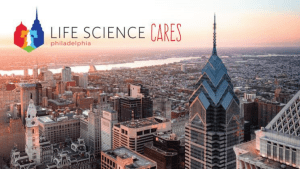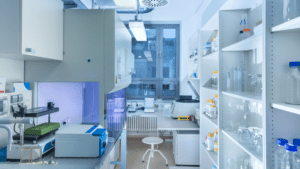
Local Entrepreneur Brings Swedish Company AcouSort to BioHealth Capital Region
February 26, 2019
For every AstraZeneca, there are hundreds of small biotech startups and scores of life science innovators that are critical to growing the BioHealth Capital Region. For every new biotech flush with investment cash, scores of smart, entrepreneur-scientists with great ideas and technology struggle to find regional funding partners.
While Big Pharma is a key anchor to any strong biotech hub, the true lifeblood of a growing, vibrant biotech cluster is the perseverance, drive and creativity of science-minded people fighting to bring new technologies and companies to a region.
Dr. Sean Higgins, who holds his PhD in cell and molecular biology, is one of these scientist-entrepreneurs fighting the good fight to keep the region vibrant and growing.
Higgins’ sweet spot is navigating the BioHealth Capital Region’s inner workings, be it investment groups, regulatory entities, government agencies or the area’s key influencers. Higgins, a Maryland resident, runs the biotech consultancy Syllogistech LLC, he is CEO of the flow cytometry device startup ExPremery, and he is the catalyst behind bringing the Swedish acoustofluidics company AcouSort Inc. to his home state.
Higgins’ consulting work with Syllogistech has him running the life science conference circuit, networking and meeting new, hopeful biotech entrepreneurs while learning about the latest emerging technologies. What’s more, as both a consultant and startup up CEO himself–his company ExPremeri has developed and been pitching a mobile flow cytometry device called Perfacs–Higgins brings a unique perspective on the industry and how the regional biotech ecosystem fits within the national life sciences landscape.
“I spend a lot of time learning what new technologies are out there. I have a good purview of what’s up and coming and what challenges exist. I use this knowledge to assist mostly young companies–especially bioanalytics companies–to commercialize their products,” stated Higgins. “I have a kitschy saying,” said a smiling Higgins. “The road is littered with great technology that’s been mismanaged.”
While the saying might be kitschy, it also happens to be true.

One of the more established companies he’s connected with, and now represents, is AcouSort, a successful Swedish-based biotech company who is now a Maryland-registered business with strong potential for growth. The company, which currently operates out of the Germantown Innovation Center, has two commercial devices–AcouTrap and AcouWash–and is developing technology that could revolutionize the way cell analysis is done.
“AcouSort’s technology is based on acoustic focusing or acoustophoresis. Our technology can push cells around from one solution to another, effectively washing cells without centrifugation. We’re able to fractionate the cells to pick off particular subtypes of white blood cells, which gets interesting in the immuno-oncology space.”
“The technology can pull off tumor-specific t-cells, which is important in the adaptive cell therapy world of CAR T. The next step from CAR T is actually using the patient’s own t-cell receptors–or TCRs–but you have to identify the TCRs that recognize the neo-epitopes.”
AcouSort has the capability to do important parts of this process bedside, simplifying and improving the process.

“There are challenges implementing CAR T and TCR processes in the broader world. For example, if a patient lives on an Iowa farm, they’d have to fly to one of the two places in the world where this process can be done. With AcouSort’s technology, we can collect the sample, fractionate it and stabilize it bedside. The cells can then be grown ex-vivo and brought back to the patient, limiting damage to the cells, reducing patient impact and lowering overall costs.”
“Ultracentrifugation of extracellular vesicles is really expensive and cumbersome. We can do this at the point of collection. AcouSort’s technology removes a lot of the process while creating a more stable sample,” he added.
AcouSort has three primary areas of focus. The company has two commercial demonstration units, AcouTrap and AcouWash, while the company’s main focus is on developing original manufacturer technology (OEM) where acoustofluidics is integrated into larger life science analytical and diagnostic systems.
The sample collection market that AcouSort is targeting within the immuno oncology therapeutic space has tremendous growth potential. “AcouSort’s technology is lower risk–they already have a few commercialized products in place–and novel–we can take blood right from someone right here and now without the downstream problems. The company is ripe for investment and growth,” stated Higgins.
However, as a startup CEO and a long-time BioHealth Capital Region insider, he feels a paradigm shift needs to occur to create the right support infrastructure to attract and grow more companies like AcouSort.
“In my opinion–and I don’t have an answer by any means, this is just my perception–our region is too focused on therapeutics. By not creating the understructure that supports therapeutics you’re really missing out on creating a stronger environment… Our region is becoming a nexus for bio production, but we have no current way to support it. We are going to run out of people to do the work. We need the workforce. And we need companies to be able to turn to a local company for the non-sexy parts of our industry. We have to start supporting lower-margin, higher-risk, higher competitive technologies if we really want to build the best core environment. It can’t be a donut,” warned Higgins.

“Stronger regional support is needed for smaller consulting groups and the individuals beating the bushes for technology. There’s a really strong chance AcouSort could build a facility and develop a workforce here in Maryland. The more support people like me receive, the greater the chance another company like AcouSort will relocate here and help the region grow,” he added.
Biotech giants like Kite Pharma might steal the headlines.
But scientist-entrepreneurs in the trenches and startup biotechs battling to leave the incubator will likely determine the BioHealth Capital Region’s future.
- About the Author
- Latest Posts
Steve brings nearly twenty years of experience in marketing and content creation to the WorkForce Genetics team. He loves writing engaging content and working with partners, companies, and individuals to share their unique stories and showcase their work. Steve holds a BA in English from Providence College and an MA in American Literature from Montclair State University. He lives in Frederick, Maryland with his wife, two sons, and the family dog.




